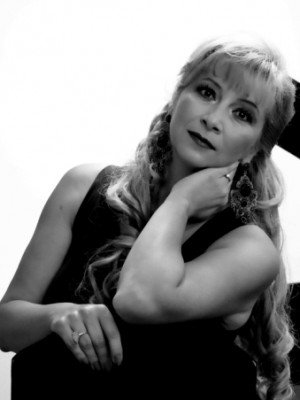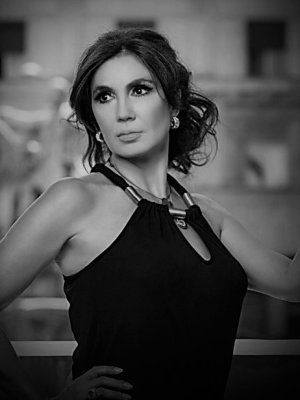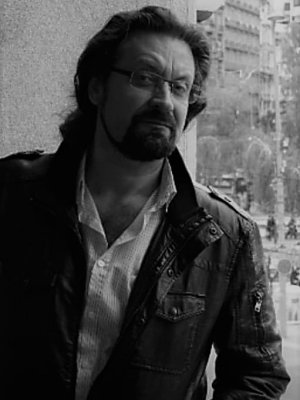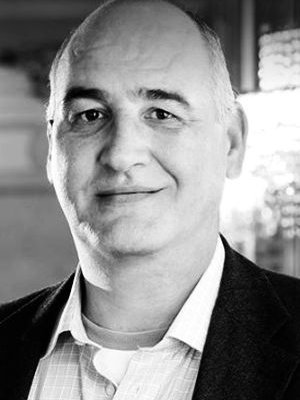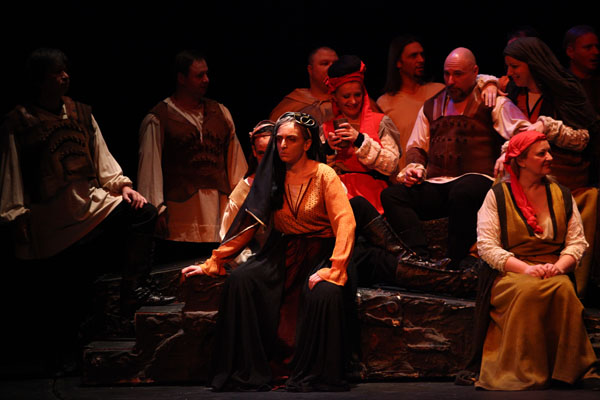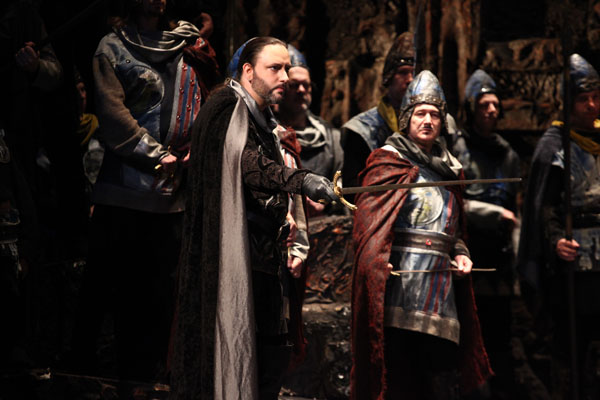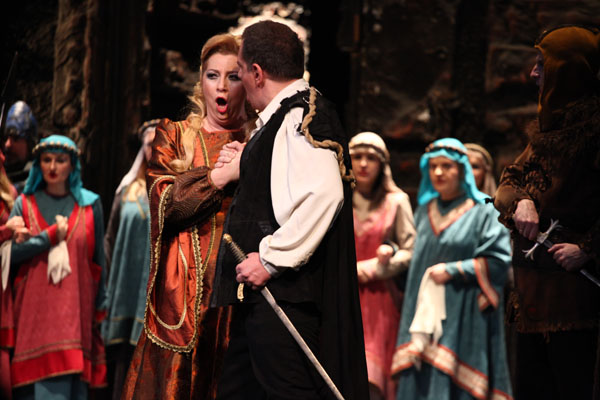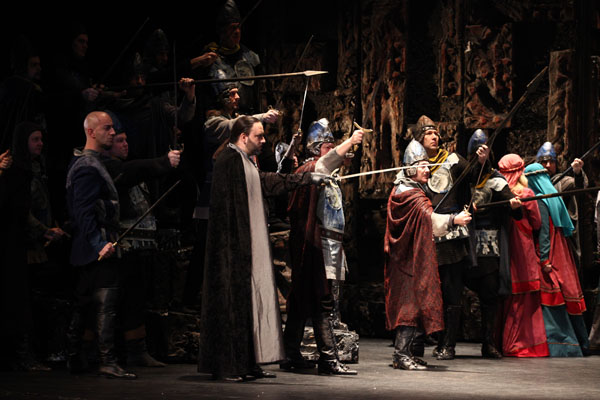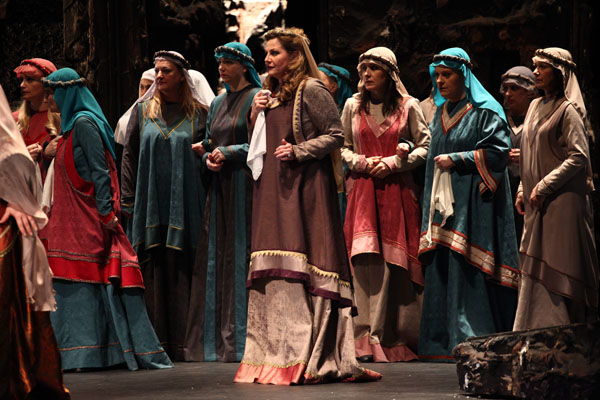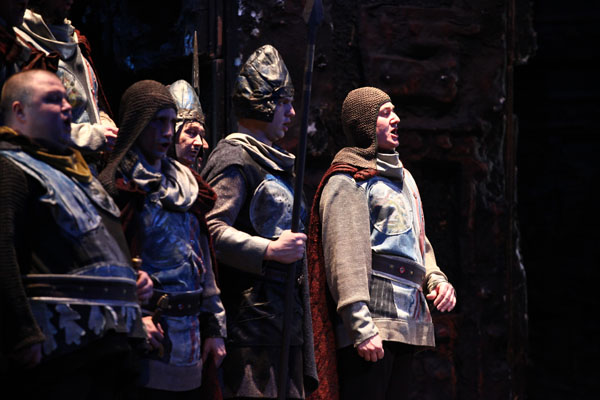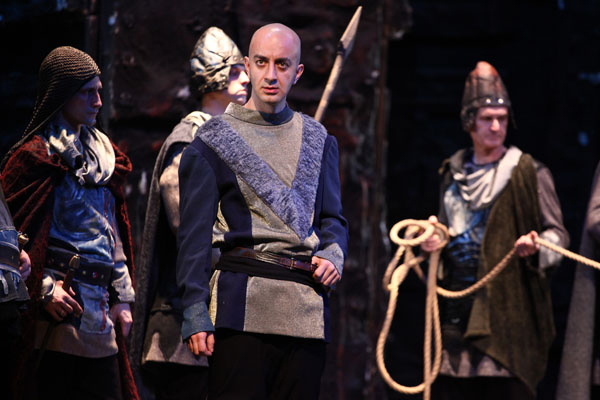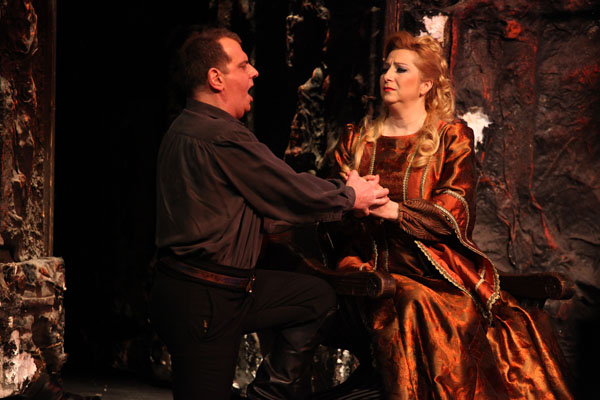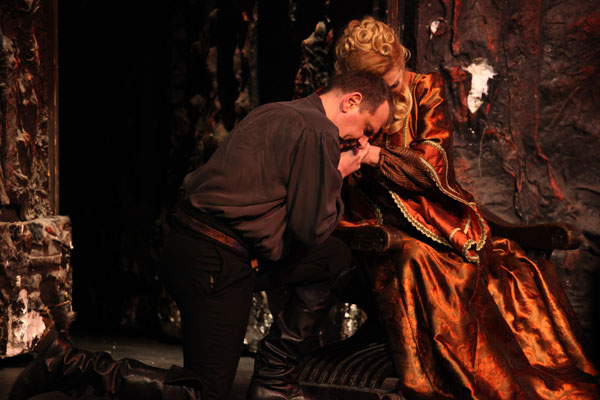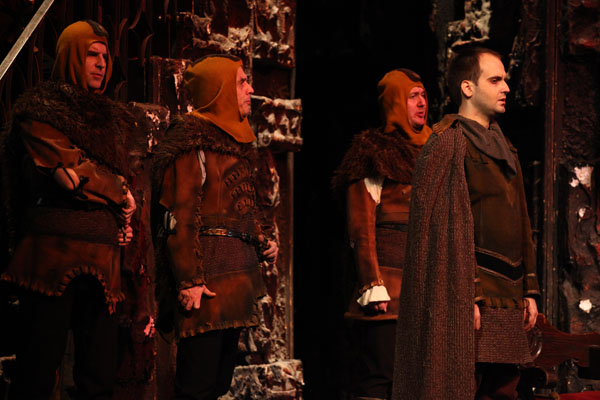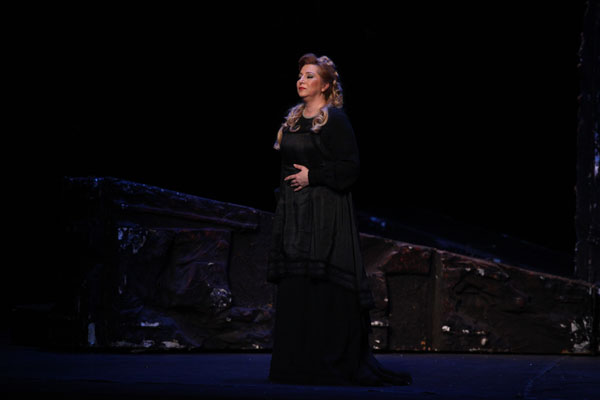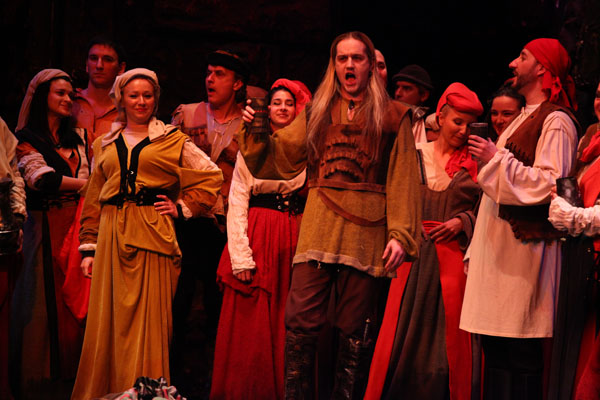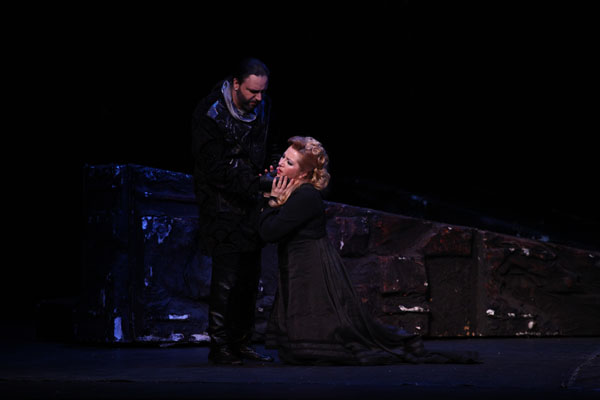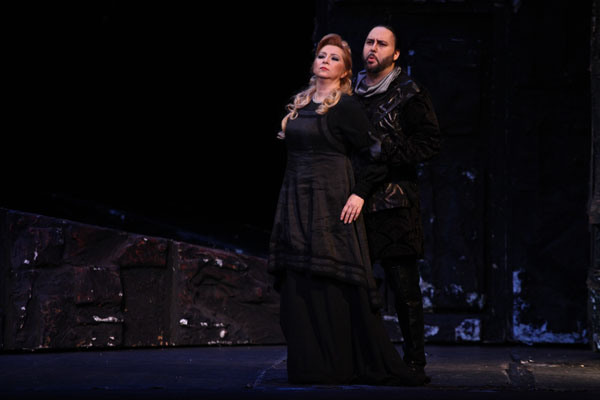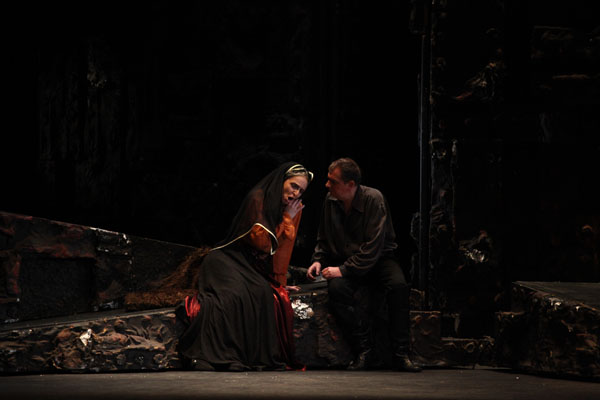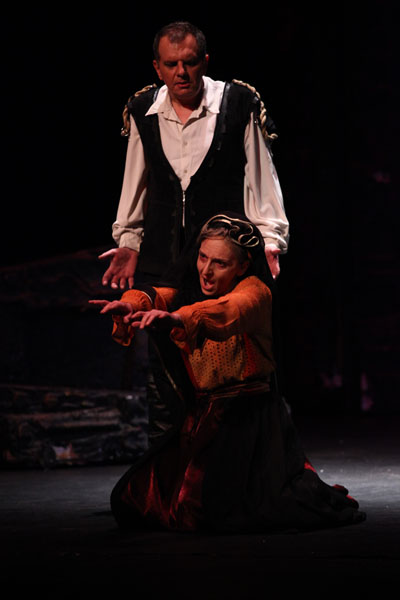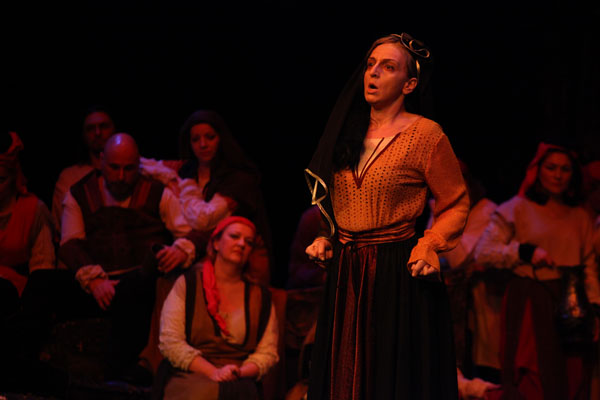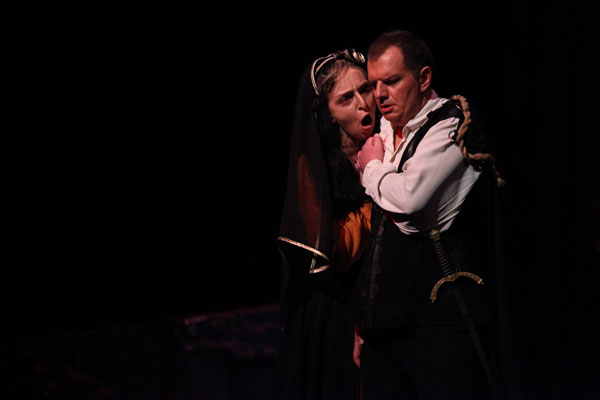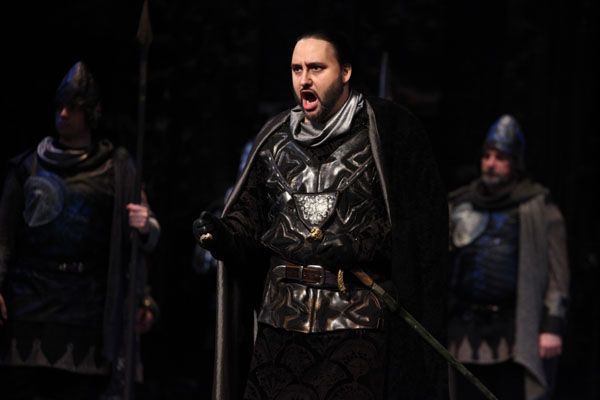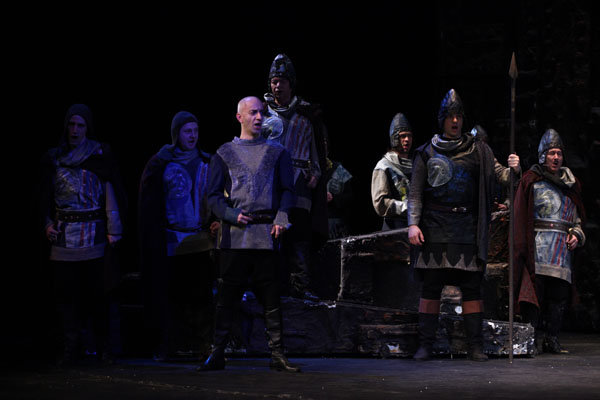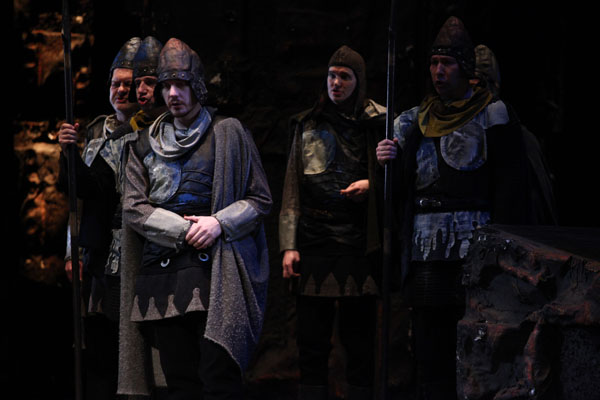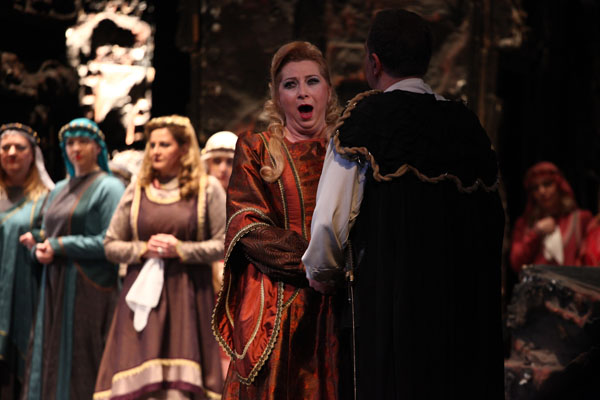About Performance
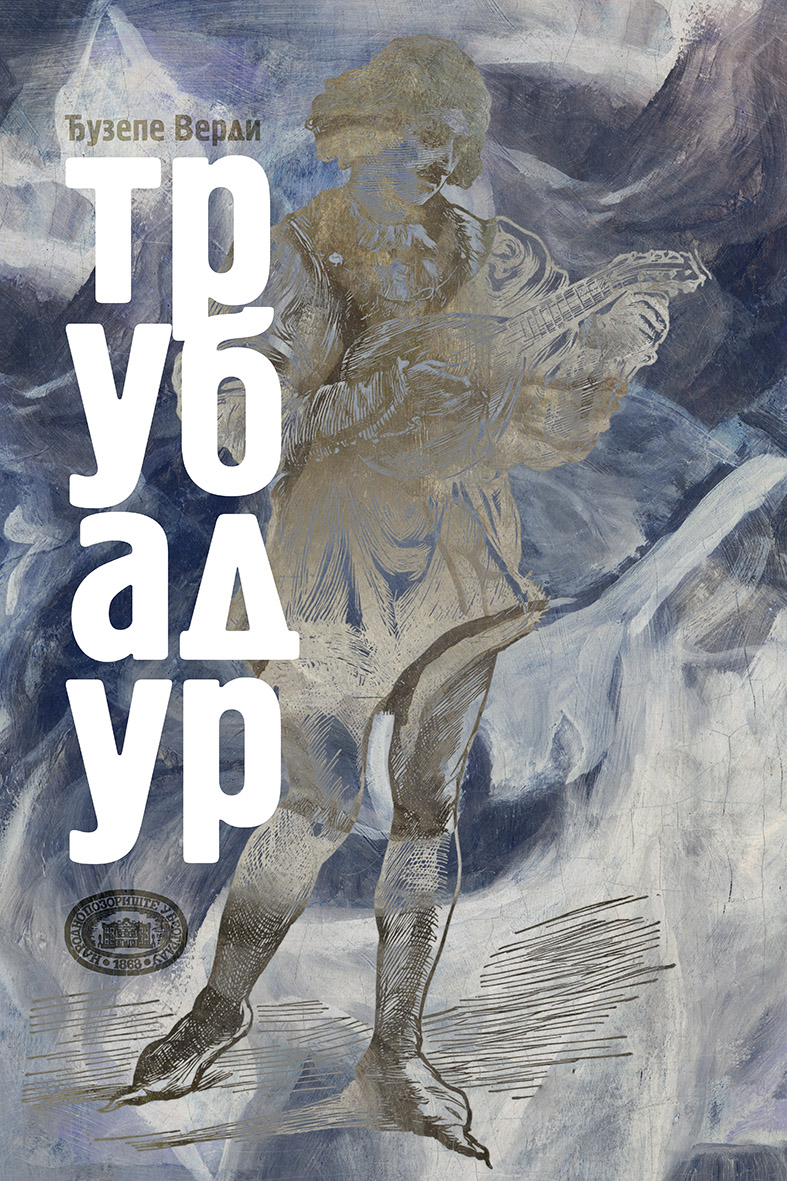
SYNOPSIS
PART ONE: THE DUEL
Scene One. In the hall of Count di Luna's castle, the soldiers await Count's return. Count di Luna is jealous of the troubadour Manrico, who serenades every night under the windows of the queen's lady-in-waiting, Leonora. Captain Ferrando tells the soldiers who keep watch about the disappearance of Di Luna's brother (Di due figli). Old Di Luna ordered that a gypsy woman who allegedly cast a spell on his son be burned at the stake. The gypsy's daughter, in order to avenge her mother, stole Di Luna's little brother from the castle. A burnt child's corpse was found on the pyre, so everyone concluded that it was the abducted son of the count. The count was the only one who could not believe it, so he commanded his other son to search for his brother, because all previous searches were in vain. It strikes midnight; the soldiers curse the old witch.
Scene Two. In the castle’s garden, Leonora tells her confidante Ines that she fell in love with Manrico, whose singing excites her every night (Tacea la notte placida). Ines implores her in vain to forget Manrico. When the women enter the castle, Count di Luna appears in the garden to pay court to Leonora. Manrico's song (Deserto sulla terra) lures Leonora outside. In the dark, she embraces Di Luna, believing it to be Manrico, and assures him of her love. When Manrico appears, she realises her mistake, and bitter Di Luna challenges his rival to a duel. We later learn that Manrico defeated Di Luna, but spared his life.
PART TWO: THE GYPSY WOMAN
Scene One. The gypsies set up a camp (The Gypsy Choir) in an abandoned castle. Among them is Azucena, who, looking into the fire, tells Manrico how her mother was burned at the stake (Stride la vampa). When she is alone with Manrico, Azucena bitterly recalls her mother's final hours and her last words "Avenge me", after which, delirious and distraught, Azucena mistakenly threw her own child (Condotta) into the fire instead of old Di Luna's son. Only now does Manrico find out that he is not Azucena's son. However, he cannot forget what he owes her: she saved his life when Count di Luna attacked him with his men and gravely wounded him. Azucena reproaches him for not finishing off Di Luna in the duel (Mal reggendo). A messenger arrives with the news that Leonora is about to take the veil in a convent after being told that Manrico has been killed. Ignoring Azucena's pleas, Manrico rushes off to prevent her.
Scene Two. Monastery. Count Di Luna with Ferrando and the soldiers is waiting for Leonora to prevent her from becoming a nun (Tutto è deserto). The bells are ringing and the chanting of the nuns is heard. When the ceremonial procession with Leonora arrives, Di Luna blocks her way, but at that moment Manrico arrives with his men and Leonora joyfully throws herself into his arms. After fighting with Di Luna's soldiers, the troubadour's entourage disarms the count. Manrico and Leonora escape.
PART THREE: THE SON OF THE GYPSY WOMAN
Scene One. Di Luna besieges the Castellor Castle, where Manrico and Leonora have taken refuge. Judging by the soldiers’ mood, it is "a merry war". Ferrando brings the news that a gypsy woman who was sneaking around the camp has been captured. It's Azucena. When Di Luna begins to question her, she tells him about her life (Giorni poveri vivea), but she looks familiar to Ferrando. When Di Luna asked her if she knew something about the boy who was burned there, Azucena flinched. Ferrando realizes who she is and Di Luna arrests her so that she too can be executed.
Scene Two. At the castle gate. Preparations are underway for the defence against the siege. Manrico and Leonora regret that these circumstances prevented their wedding and he assures her of the power of love (Ah! Si, ben mio). Ruiz informs Manrico about Azucena’s capture and the fate that awaits her. He then orders everyone to gather in order to break the siege and save Azucena (Di quella pira).
PART FOUR: THE EXECUTION
Scene One. Manrico lies chained in the dungeon of Di Luna's palace; he lost the battle and became imprisoned himself. However, Leonora managed to escape and now, in front of the palace, she attempts to save her beloved's life (D'amor sull'ali rosee). A prayer for the salvation of the soul can already be heard from the chapel, Manrico and Leonora say goodbye (Miserere). Di Luna arrives, Leonora begs him to pardon Manrico, but since the count refuses to do so, she promises to give herself to him. However, Leonora secretly drinks the poison from her ring (Duet).
Scene Two. Manrico was allowed to say goodbye to Azucena. In the dark dungeon, he tries to soothe her. She can already feel the cold breath of death and almost mad with fear she hopes to warm herself on the pyre. They remember their former life (Ai nostri monti). Leonora arrives and tells her lover that he has been released. When she admits at his insistence at what cost she achieved this, he accuses her of infidelity in a wild rage. However, Leonora dies from the poison (Prima che d'altri vivere). When the count realises that he has been deceived, he orders the execution of Manrico. After the execution, Azucena triumphantly tells the count: "He was your brother! You are avenged, oh mother!"
Premiere performance
Premiere, 22nd November 2001
Main Stage
Guiseppe Verdi
IL TROVATORE
Opera in four acts
Conductor Dejan Savić / Zorica Mitev Vojnović
Stage Director Ivana Dragutinović Maričić
Set Designer Aleksandar Zlatović
Costume Designer Ljiljana Orlić
Premiere Cast (first name on the list):
Count di Luna Nikola Mitić / Nikola Mijailović / Zoran Aleksandrić
Leonora Višnja Pavlović Drakulić / Jasmina Trumbetaš Petrović / Vjera Mikić
Azucena Jelena Vlahović / Dragana del Monaco
Manrico Dušan Plazinić / Nikola Kitanovski / Sergej Dubrovin
Ferrando Branislav Jatić / Sveto Kastratović
Ines Olivera Dukić / Aleksandra Stamenković
Ruiz Aleksandar Dojković
Messenger Darko Đorđević / Tomislav Vitaz
Old Gypsy Aleksandar Stamatović / Nemanja Pavlović
Nuns, the Count’s lackeys, soldiers, Gypsies
The Choir and the Orchestra of the Opera of the National Theatre in Belgrade take part in the performance.
Concertmaster Balint Varga / Iskra Uzelac
Choir rehearsed by Đorđe Pavlović
Stage music lead by Ana Zorana Brajović
Assistant Costume Designer Branka Đuričić
Music Associates Srđan Jaraković / Nevena Živković / Dragan Radivojević / Nada Matijević
Screenplay Mirjana Goločevac / Dejan Filipović
Prompter Silvija Pec
Organiser Maša Milanović Minić
Translation and caption Konstantin Carina
Leading Painter Miroslav Nikolić
Leading Sculptor Stanimir Pavlović
Make-Up Nijaz Memiš
Lighting Master Miodrag Milivojević
Stage Master Zoran Mirić
Head of Decor Željko Rudić
The costumes and sets were made in workshops of the National Theatre in Belgrade.




